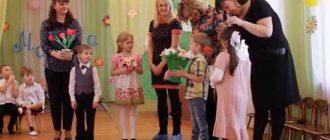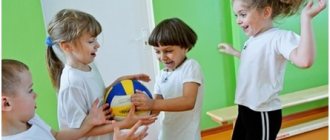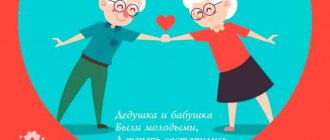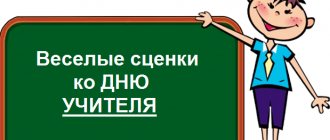It is not without reason that they say that a teacher is the second parent of every child in the class. Teacher's Day is a very important professional holiday for every teacher. Very often an invisible connection arises between teacher and student. After all, it is with the teacher that the children spend a lot of time and learn something new.
It is the teacher who teaches us mathematics and geography, but not only that, but also what good and evil are, and how to become a successful person. The teacher will always understand, give valuable advice, and support in difficult times. It is not surprising that there is such a holiday as Teacher's Day. How can you celebrate it with your students in a fun and unforgettable way?
How to organize a holiday for Teacher's Day?
To organize a good holiday, first of all, you need to choose a place. Most often this is a school. You can arrange a fun celebration in your own classroom, after school. Several students, most often girls, will help paint the classroom. The boys will move their desks to create more space in the classroom. You can buy cake, various pastries and sweet water. But an integral part of any holiday at school, be it February 14 or March 8, are funny competitions. What competitions can be chosen for Teacher's Day to make this day memorable for a long time?
Fun games and competitions for Teacher's Day.
Competition No. 9. "Shakespeare's Works".
This competition is more intellectual and will especially appeal to a teacher of foreign literature. 4 people must participate in the competition. Each participant rolls the dice, thereby determining who will be first, second, third and fourth. In the appropriate order, each participant recites by heart a passage from some play or any sonnet by Shakespeare that he remembers. If all four were able to tell something, we go in a circle again. So until there is only one winner left.
Textbook
Players are divided into teams. Each team writes its own “textbook”. This is an ordinary notebook, on each sheet of which participants write one comic task. For example, raise your leg, close your eyes, wave your left hand, whistle, and so on. After which the teams exchange textbooks. They are given one or two minutes to prepare, and then all players must perform the actions in exactly the order in which they are indicated in the “textbook”. The winner is the team that has learned the theory better and completed the task correctly in practice.
Competition No. 11. "Cubes".
This competition involves 2 teams of 3 people. The first team is a boys team, blue. The second is the girls' team, pink. Each team is pinned to the chest and back with a letter of the corresponding color. Now these students are cubes. The first team comes to the board. The teacher times the minute. The presenter says simple words consisting of 3 letters, and the team must line up so that this word is formed. Then the second team does the same. The team with the most words wins.
Teacher to teacher
Teachers are asked questions from all subjects, whoever raises their hand first. He answers. For the correct answer - one point; naturally, the teacher who teaches the subject from which the question was asked does not answer. Whichever teacher can score more points wins. Examples of questions: Who wrote “Woe from Wit” (Griboyedov) What is the name of the first part of the physical education lesson? (organizing) How is power measured? (watt) What is the name of a chemical reaction that produces heat? (exothermic) Do prokaryotes have a nucleus? (no) Did Prince Igor fight with the Tatars or Pechenegs? (with the Pechenegs)
"Flagships of Education"
The All-Russian professional competition “EDUCATIONAL FLAGSHIP” is held by the Ministry of Education of Russia and National Projects of Russia.
The purpose of the competition: to identify and support talented managers in education. This is a platform for sharing experiences and disseminating best practices, where managers can express themselves and find like-minded people. The winners will have the opportunity to undergo educational programs and internships, as well as gifts from partners.
Who is participating: a team of 4 employees of a general education organization (director or his deputy, deputy director, two class teachers).
Registration: from October 7 to November 30, 2021 via the link.
Participants will have to take an online test in three parts: a general cultural test, a functional literacy test, and a management test. Then they will have a full-time semi-final, and the final will take place in April 2022.
"Dramateshka" is the largest archive of children's plays in RuNet
Teacher: Schoolchildren are cheerful, sociable people and will not miss an opportunity to joke, play pranks on each other and their teachers, and have a lot of fun, especially on the bright holiday of Teacher’s Day. And let this fun be facilitated by the fun lessons that will take place in a few minutes. The assessment system also “asks” to be unusual. Let knowledge and skills be assessed on a five-point scale of jokes (i.e. candies, chocolates, office supplies - paper clips, buttons, pencils, etc.) For each completed task, participants receive the appropriate amount. The most successful “students” will receive the title “Prankster 20..”. The schedule of cool lessons is as follows: 1. Russian language. 2. Mathematics 3. Foreign language 4. Music 5. History - RUSSIAN LANGUAGE LESSON - Assignment for teachers (Teachers of the Russian language are called. They have to write a dictation on the board, but each word of the text must be written, arranging all the letters in the reverse order, although they are pronounced will be as usual) TEXT FOR DICTION: No, all of me will not die, The soul in the treasured lyre will survive, And decay will escape, And I will be glorious, As long as at least one drink is alive in the sublunary world. (A.S. Pushkin. “I erected a monument to myself not made by hands”) (The written dictation is slowly read aloud) - MATHEMATICS LESSON - (Math teachers are called - they are given cards and they prepare) TASK OPTIONS: - Of every 2575 poor students, one becomes a school principal . How many poor students will make 14 school principals? (36050) — Elevator lifting capacity is 450 kg. 2 first graders, 20 kg each, entered the elevator. each, 2 third-graders, 25 kg. each, 3 fifth graders, 40 kg. each and a math teacher who weighs the same as 1 first grader, 2 third graders, and 3 fifth graders combined. Will the elevator go up? (400) - Archaeologists in the distant future will unearth two petrified diaries with a large number of petrified twos. In Kolya’s diary they will find 224 petrified twos, and in Tolya’s diary they will find ? the numbers of these twos. How many fossilized twos will archaeologists find in two diaries? (280) Assignment for teachers OPTIONS: - Derive the formula for student happiness - Prove the theorem about the interdependence of life's direct classmates and their intersection in the time period of school life and beyond. -Substantiate the postulate about the impossibility of equality of sides of a school love triangle - Answer the question: does the dividend recognize itself after division if before division we multiply the dividend by the divisor? — FOREIGN LANGUAGE LESSON — Assignment for teachers (Foreign language teachers are called. They are asked to translate into generally understandable Russian an excerpt from the second chapter of A.S. Pushkin’s story “Dubrovsky”, previously translated into the language of youth slang by V. Trukhin. Read out one paragraph at a time - the teacher tells it close to the text) TEXT: “Having arrived in the town, Andrei Gavrilovich hung out with his friend, the scoundrel, hung out with him and in the morning threw dice at the mentor. Everything there was purely purple. Then Kirill Petrovich taxied up. All six immediately jumped up and stuck their hands under the locators. The hillocks hung out with him at the laurel, as the coolest authority, they swiped the chair, in short, a paragraph. And Andrei Gavrilovich quickly perched himself against the wall. Then the awesome kochum came, and the secretary unsheathed his noodle gun and told the pontjar that both the bungalow and the entire estate should be unfastened to the bull Troekurov. The secretary shut up and walked over to Troekurov, gave him a wave, and Troekurov waved him with a quickdraw. It’s time to catch up and give Dubrovsky a wave, but he wanders off. Suddenly he picked up the dundel, hatched the zenki, stomped on the blank and hit the secretary so hard that he naturally made a layer, grabbed the inkwell and threw it at the assessor. Everything is natural, we met each other. And he imposed a multi-party rule on everyone, attacked Troekurov, in short, he screwed everyone up. The scammers came running, extinguished Dubrovsky, packed him up and threw him into the sleigh. Troekurov with his sixes also taxied out of the office. The fact that Dubrovsky went crazy all at once stressed him to the fullest and took all the fun out of him.” DICTIONARY OF “ForEIGN” WORDS Balabuz - entrepreneur Pull - pleasure Hillock - influential person Awesome - significant Bungalow - house Overwhelm - be horrified Dundel - head Plast make - fall Extinguish - calm Drive the pontyara - give out knowingly false information Preparation - leg Bring down - come, come Zamarzefan - hit Waving - sign Scam - security guard On the laurel - good, excellent Kochum - inaction Uncover the noodle gun - start talking nonsense Ksiva - document Dumb - uncomfortable Find yourself - spend the night Hang out - meet Strain - make an unpleasant impression Lost your mind - go crazy Cover it with a multi-party, run over , screw up - scold Town - city Break the buzz - ruin the celebration Pack - tie Pork - give Violet - indifferent Unfasten - give Six - a person subordinate to someone - MUSIC LESSON - Assignment for teachers Six squares are drawn on the board. (The teacher and three children come out. Each square is a word from a line of the song. Teachers and students take turns calling the number of the square - a word is written in the square. Participants sing a fragment of a song with this word; then the next rectangle, the song is performed; until all the squares are solved) Homeland school life was orderly - HISTORY LESSON - (The teacher and three children come out. The children take turns asking the teacher questions. QUESTIONS: 1. Do you believe that school in Greek means “leisure”? Yes. But the Greeks did not mean idleness by leisure, and free conversations during leisure hours with wise philosophers about various sciences. 2. Do you believe that there are higher educational institutions whose names translated from Latin mean “universe”, “world”, “the whole world”? Yes, these are universities , formed from the Latin word "universum". 3. Do you believe that in ancient Greece those who taught were called educators? No, a teacher was a slave who took a child to school and monitored his behavior. 4. Do you believe that In the old days, a student who stumbled through a given lesson was called a dunce? Yes. In old gymnasiums, a student who did not prepare a lesson and read a book with hesitation was mockingly called a stutterer. In Latin, a stutterer is a dunce, which is where the Russified version of the word “boob” comes from. 5. Do you believe that the teacher’s requirement to “know it by heart” goes back to the times when they demanded that the text be hardened so perfectly that it would fly off your teeth? No, this saying arose from the custom of testing the authenticity of gold coins and other items made of precious metal. To know by heart literally meant to obtain the necessary knowledge with the help of one’s own teeth. 6. Do you believe that when in ancient times people used the expression “notch your nose” when addressing each other, they were aware of the cruel ancient custom of making a mark on a person’s nose on especially important occasions? No. The nose here does not mean the organ of smell, but a memorial tablet, a tag for notes. In ancient times, illiterate people always carried with them such tablets with notches made for memorization. They were called the nose. 1st: Dear teachers! We truly value, love and respect you. And in lessons we listen to you very carefully. And they even learned some of your phrases by heart. In alphabetical order A- And now there will be a summary of knowledge! B - Don’t come tomorrow without your parents! B - Everything I say goes past your ears D - Let’s go without “let’s”! Z - Stop muttering! And - And where is your second shoe? N - You need my help, please, but on your own! O - “D” again? R - Once I speak, everyone is silent! S - How many times can you say not to sit on the windowsill! T - So what interests you more? What am I saying or the dead pigeon flying over the school? E - This test will be in January of this month. Me - I also know how to read a textbook with one eye and look at the teacher with the other. : And once again, happy holiday to you. 1st: Happiness! 2nd: Hello! 3rd: Energy! 4th: Enthusiasm! 5th: Have a good mood! 6th: Capable students! 7th: Responsible parents! 8th: Loyal administration! 9th: Optimism! 10th: And a big salary! Diploma for our beloved teacher Certificate for the best teacher, for being the most excellent teacher! although it happens that you give different ratings - you behave defiantly! Every lesson you call us to the board - the most wonderful! always notice our successes and shortcomings - the bravest! that is, with chalk - the most responsible! you know the answer to any question - the most decent one! You call us to order during lessons and breaks - the most sensitive! You always feel who is not ready for the lesson - the most unforgettable! never forget what you assigned for homework - the most inquisitive! love it when we all know - the coolest! in every sense of the word And now the most literate - now you have a literacy!










